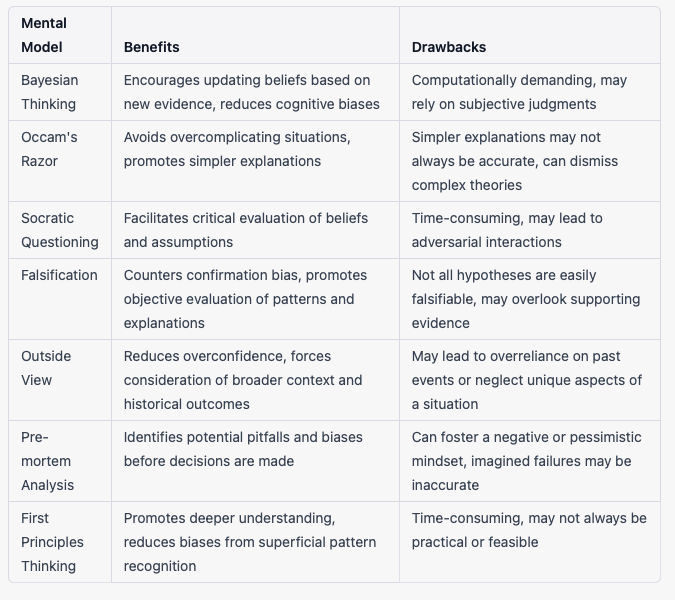Enhancing Critical Thinking and Reasoning with Mental Models
In today's increasingly complex world, developing a keen understanding of cognitive biases and heuristics that shape our thinking is crucial. People are naturally skilled at detecting patterns and trends, even in random data, but often struggle to critically evaluate them or assess their likelihood accurately. Fortunately, mental models can help alleviate these potential issues and improve our reasoning abilities.
Mental Models to Improve Reasoning:
Incorporating the following mental models into our thought processes can significantly enhance our critical thinking, decision-making, and reasoning abilities:
Bayesian Thinking: This mental model is based on Bayes' theorem, a fundamental principle in probability theory. Bayesian thinking encourages us to continually update our beliefs based on new evidence. By revising our views in light of new information, we can counteract biases like confirmation bias and become more adaptable.
Occam's Razor: Occam's Razor is a principle that suggests that, among competing hypotheses, the one with the fewest assumptions should be selected. By choosing simpler explanations over complex ones, we can avoid seeing patterns that don't exist or overcomplicating situations.
Socratic Questioning: Inspired by the ancient Greek philosopher Socrates, this approach involves asking probing questions to challenge assumptions and explore the logic behind a belief. By engaging in Socratic questioning, we can better evaluate the validity of patterns, explanations, and interpretations.
Falsification: Developed by philosopher Karl Popper, falsification emphasizes the importance of attempting to disprove or falsify a hypothesis rather than trying to confirm it. We can counteract confirmation bias by seeking evidence against our beliefs and becoming more critical in evaluating patterns and explanations.
Outside View: When assessing a situation or making a prediction, instead of relying solely on the case's specific details, try to consider the broader context and how similar situations have unfolded in the past. This mental model can help us avoid overconfidence and base rate neglect by forcing us to think more objectively.
Pre-mortem Analysis: Before making a decision or taking action, imagine that your choice has already failed, and then try to identify why it did. By conducting a pre-mortem analysis, we can identify potential pitfalls and biases affecting our thinking, helping us make more informed decisions.
First Principles Thinking: This mental model involves breaking down complex problems into their fundamental elements and reasoning from those basic principles rather than relying on analogies or conventional wisdom. By adopting first principles thinking, we can develop a deeper understanding of a situation and avoid biases that stem from superficial pattern recognition.
By incorporating these mental models into our thinking, we can improve our ability to critically evaluate patterns, explanations, and interpretations and make more informed decisions. Using a combination of models is essential to achieve a more balanced and accurate understanding of the world.
Historical Figures and Mental Models:
Examining historical figures and their actions through the lens of mental models can provide valuable insights into how these frameworks could have shaped their decisions and the resulting outcomes.
Galileo Galilei: Galileo's commitment to empirical evidence and willingness to challenge prevailing beliefs to illustrate the importance of overcoming confirmation bias. Adopting falsification and Bayesian thinking could have allowed him to continually refine his views based on new evidence and challenge existing assumptions. This approach contributed to a paradigm shift in our understanding of the cosmos. It laid the groundwork for modern science, encouraging future scientists to question established beliefs and base their conclusions on empirical evidence.
Charles Ponzi: Ponzi's infamous scheme demonstrates the impact of the availability heuristic and people's tendency to focus on positive information. Mental models like outside view and pre-mortem analysis could have helped potential investors to better assess the risks involved and identify the unsustainability of Ponzi's scheme. The collapse of Ponzi's scheme led to increased scrutiny and regulation of financial markets, ultimately contributing to future investors' protection. It also serves as a cautionary tale, reminding us of the importance of critical thinking and skepticism.
Sir Arthur Conan Doyle: Despite his logical fictional character, Sherlock Holmes, Doyle was fascinated by spiritualism and the paranormal. Applying Occam's razor and Socratic questioning could have helped him distinguish between genuine patterns and coincidences or misinterpretations. Doyle's belief in the supernatural serves as a reminder that even intelligent individuals can fall prey to cognitive biases. This example highlights the importance of being aware of our biases and using mental models to counteract them, ensuring we make more informed decisions in various aspects of life.
Incorporating mental models into our daily lives can improve our decision-making, critical thinking, and reasoning abilities. These frameworks can help us navigate an increasingly complex world and make better personal and professional choices.
To further develop your understanding of mental models, biases, and decision-making, consider the following books:
"Thinking, Fast and Slow" by Daniel Kahneman
"Superforecasting: The Art and Science of Prediction" by Philip E. Tetlock and Dan M. Gardner
"The Art of Thinking Clearly" by Rolf Dobelli
"Poor Charlie's Almanack: The Wit and Wisdom of Charles T. Munger" by Charles T. Munger and Peter D. Kaufman
"The Black Swan: The Impact of the Highly Improbable" by Nassim Nicholas Taleb
By delving deeper into these topics and applying mental models to your everyday life, you can enhance your critical thinking skills and make more informed decisions, ultimately leading to better outcomes in various aspects of life.
